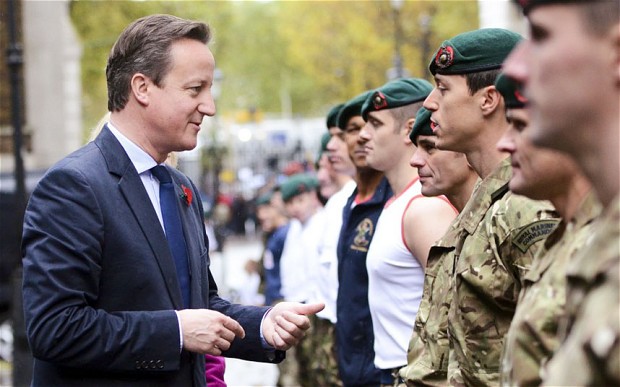
David Cameron: We must remember for ever, not just for today
2012-11-11 01:34:10
The Prime Minister writes about his plans to do more to improve the living conditions of servicemen and women and their families.
Many years ago I visited the battlefields at Gallipoli. I saw the beach
at Suvla Bay where the Allies landed, walked the hills where those desperate,
bloody battles took place, and came across a memorial that has stuck with me
ever since.
There, under the bright Turkish sun, it said: أ¢â‚¬إ“You, the mothers, who sent their
sons from faraway countries, wipe away your tears; your sons are now lying in
our bosom and are in peace.أ¢â‚¬آ
That, to me, sums up the spirit of Remembrance Sunday. By wearing poppies on our
lapels, the British people show weأ¢â‚¬â„¢ve taken all the sons and daughters who have
fallen to our heart, whether they were from the British Isles or the
Commonwealth.
This yearأ¢â‚¬â„¢s Remembrance Sunday is particularly poignant أ¢â‚¬â€œ because more than
ever, we look back as well as forward.
We look back as we approach the 100th anniversary of the outbreak of the First
World War. Some may think that after a century it is time to move on. I could
not disagree more أ¢â‚¬â€œ and that is why I support The Sunday Telegraphأ¢â‚¬â„¢s أ¢â‚¬إ“Lest We
Forgetأ¢â‚¬آ campaign to save the nationأ¢â‚¬â„¢s war memorials.
There are so many reasons to commemorate the anniversary properly. First, the
sheer scale of the sacrifice: 20,000 killed on one day alone in the Battle of
the Somme; countless sons and sweethearts who never got to march back home. Then
there is the huge geopolitical impact to remember أ¢â‚¬â€œ the unleashing of Nazism and
Bolshevism that caused immeasurable suffering for decades afterwards.
Beyond all this there is a less tangible, but no less important reason, to
commemorate; the pull that the First World War still exerts on the British
heart. Whether itأ¢â‚¬â„¢s through the poems of Wilfred Owen or the memoirs of Robert
Graves, this war has a powerful hold on our national consciousness. Those who
fought in the trenches, at sea and in the air are still our boys أ¢â‚¬â€œ and the 100th
anniversary has to reflect that.
To that end I have appointed a top team to run the centenary. Their plans
include a massive transformation of the Imperial War Museum in London,
educational programmes to teach our children more about the war, and big outdoor
commemorations that will unite the country in national pride أ¢â‚¬â€œ including at
Folkestone, the port where so many left for France, and at a number of
Commonwealth War Graves Commission sites.
I have been very clear in my ambition: that this centenary should capture the
British spirit, in every corner of the country أ¢â‚¬â€œ from our schools to our
workplaces to our town and village halls. This is for those like the 20-year-old
soldier who wrote just a week before he died: أ¢â‚¬إ“But for this war, I and all the
others would have passed into oblivion like the countless myriads before us, but
we shall live for ever in the results of our efforts.أ¢â‚¬آ We will make sure they
do.
Remembrance Sunday is a time not just to look back, but forward too أ¢â‚¬â€œ to what
more we can do for those who serve in our Armed Forces today, and for our
veterans. This government has taken the Military Covenant أ¢â‚¬â€œ which was frankly
gathering dust on the shelf أ¢â‚¬â€œ and made it something meaningful, writing its
principles into the law of the land.
It sums up the responsibilities we as a nation have for our Armed Forces, for
the duty they show us. Already itأ¢â‚¬â„¢s making a real difference. The operational
allowance paid to those on the front line has been doubled. Council tax relief
for those on operations has been doubled too. A pupil premium helps get Forcesأ¢â‚¬â„¢
children a better education.
Weأ¢â‚¬â„¢re doing more, too, to help those who have been injured lead fuller lives.
These are fit men and women who joined the Armed Forces because they loved being
active.
I have been to Headley Court [the Forcesأ¢â‚¬â„¢ rehabilitation centre] several times
and am always struck by the people who have been injured who want to climb
mountains, walk across the Arctic, have fresh adventures.
They must be able to do so. Thatأ¢â‚¬â„¢s why we are making sure that top-notch
prosthetics are available to those who have lost a limb أ¢â‚¬â€œ not just directly
after their injury, but always.
I have instructed our newly established Armed Forces Cabinet committee to focus
on a new priority: making sure the homes our Armed Forces live in are radically
improved.
Too many are small and substandard after years of neglect. Considering the risks
these people take for us, that is just not right. Already this year weأ¢â‚¬â„¢ve
committed
أ‚آ£100 million of extra investment in Services homes. Now I want us to look at
what more we can do أ¢â‚¬â€œ even giving those in our forces help on to the housing
ladder.
Looking out for our Armed Forces is not a job for Government alone; itأ¢â‚¬â„¢s for
individuals, charities and neighbourhoods too. Thatأ¢â‚¬â„¢s what the Community
Covenant initiative, launched last year, is about أ¢â‚¬â€œ creating a bond between a
community and their local Armed Forces.
This is happening across the country, with more than 200 Community Covenants
already أ¢â‚¬â€œ and I urge other towns and cities to come forward and create one of
their own. For decades the bravest of the brave have
laid their lives down for us and done this country proud أ¢â‚¬â€œ and on this special
Remembrance Sunday, we must all vow again to do them proud too.
Comments